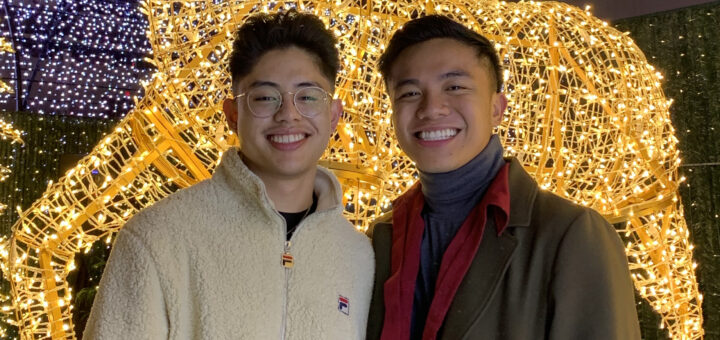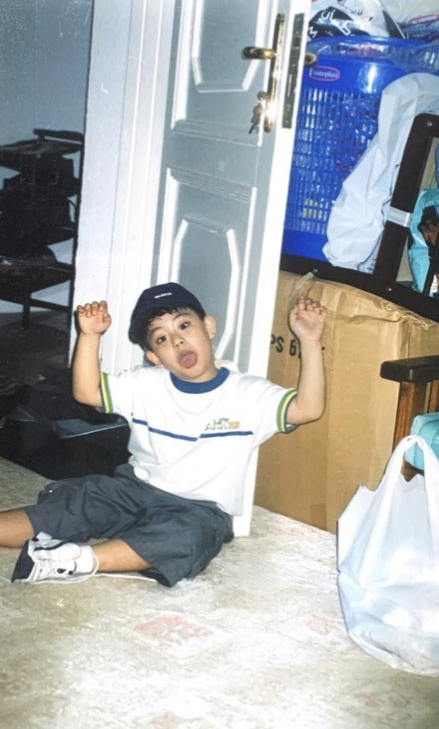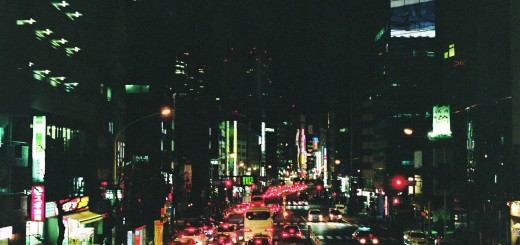Being queer and Filipino in Calgary: Hindering your true self

by Riggs Zyrille Vergara, Publishing Editor
When 20-year-old Mount Royal University nursing student Ian Rivero was in high school, there was a Starbucks store that he found himself visiting every day. It might seem like because he just needs his daily dose of caffeine. But it’s also partly because of this cute now 23-year-old barista named Kit dela Cruz.
What started out as simple morning hand-offs of hot beverages and the occasional sweet treats became so much more when they found themselves matched on the dating app Tinder.
But to say there wasn’t already a spark during those good morning greetings is just false. Dela Cruz also recalls making sure he gets to be the barista to make Rivero’s grande mocha every time he comes in. It’s always his best creation of the day.
Currently, they are in the third year of their relationship; consistently supporting each other’s endeavours and careers – dela Cruz with his visual art and graphic design and Rivero with his cooking TikTok videos and nursing journey.
But reaching this point in their lives was not an easy journey. Before they met, they each had to grapple with the pressures of their environment in terms of sexuality and being Filipino.
The push and pull of family and religion
As a 6-year-old kid from Calamba, Laguna, Philippines, Kit Dela Cruz was always seen as the life of the party in school. His friends would describe him as a bubbly kid that can always get a laugh out of them. But going home to his religious auntie who was taking care of him at the time, he knew he had to act differently.
“They [My aunt] had their own values. They had their own perspective on things. That made me a bit nervous to be myself when I’m at home,” dela Cruz said.
It was no different two years after when he moved in with his uncle who’s Muslim.
“Whenever I come home from school, I feel like I have to be this different person. I have to pressure myself to act straight,” dela Cruz added.
Dela Cruz didn’t move to Canada until he was 13 years old. The last two years before he moved to Canada, dela Cruz was enrolled in a Catholic school. During that time, he felt restricted in the way he dressed and presented himself in public. Teachers would control things like his clothing and hair style.
“Religion, in a way, hindered my way of expressing myself to be me fully,” he said.
Even though dela Cruz has a supportive family in Calgary, the same is not true with his family in the Philippines.
“There’s still a little bit of an issue there. I stopped talking to some of them because of how I am, but it’s okay.”
According to dela Cruz, whenever he does need to talk to close-minded people in his family, he has to mentally prepare himself in a way where he carefully chooses his words.
“I do want them [my relatives] to know that I am this gay person, but I don’t mean it as an offense to their faith and values,” he added.
But dela Cruz also adds that he still looks at family with such importance.
“Regardless of our differences in faith and values, what I miss about the Philippines the most is family. It’s where I feel at home.”
Although dela Cruz was an extroverted kid with a lot of friends during his elementary days in Calamba, he can’t help but also feel different sometimes.
“I’ve always thought that I liked girls. I remember being forced by my classmates to ask out girls who seem to have a crush on me.” he said.
Dela Cruz even went as far as dating a girl in seventh grade, but for him, it didn’t feel right.
“I just felt that dating girls was not a fit for me. I was exploring it but I found out soon that I just liked boys more,” he added.
The line between knowing and hiding
For Rivero, he immediately knew that he liked boys at a pretty young age.
He was five years old when he knew it. While exploring a dictionary his parents gave him, he saw a certain page that he can’t help but just stare at for a long time. In that page is a little boy around his age wearing swimming trunks.
“I always turn to that page, and I always just look at it. And I don’t know why but at that point, I knew something’s different,” Rivero said.
Since moving to Calgary and going to preschool, Rivero already knew in himself that he was gay. This made him gravitate toward having more female friends as they also felt comfortable being around him. But he never really told anyone about his identity.
This played a big part in high school – what he calls a big turning point in exploring his identity as a gay man.
Going into high school, Rivero felt that he had to hide being gay. Being friends with a group of boys only solidified this idea that he had to act more masculine and stereotypically straight.
“At that point, I adopted a lot of toxic masculinity traits in hopes of trying not to be gay anymore… Even at this current stage of my life, I’m still trying to unlearn a lot of those traits,” Rivero said.
Rivero found himself looking down on guys who usually act, talk and dress in a feminine manner because that’s what his friends do. He even policed his own actions. When he finds himself acting feminine, he tries to push it down. He made sure that he’ll always act masculine when he’s with them.
“It was hard. It felt like I was putting on a show every day. It was damaging to myself at the end of the day,” he added.
But eventually, Rivero decided to move away from that kind of friendship.
“After cutting them off, I started exploring more of myself, being less hateful towards myself; especially being gay and not being ashamed of that,” Rivero said.
Being gay and Filipino
Dela Cruz significantly felt that it’s much better to live out his gender identity in Canada. With both the presence of his supportive Mom and two married gay aunts, he always feels loved and accepted at home. But living in a predominantly conservative city like Calgary can present its own set of challenges.
Working as a barista, dela Cruz once encountered an old lady who told him that she hated the store next to them because they put up rainbow flags and celebrate Pride.
“Being as gay as I am, and the fact that she told that to my face, I felt “shooked”. That’s the right word for it,” dela Cruz said.
Dela Cruz also shared that whenever he and his LGBTQ+ friends go out, they need to have prior knowledge of the attitudes of the spaces they go to. This is so they can be sure that they will be safe and not be put in any kind of danger simply because of their gender identities.
“We try to stay away from places that we feel are not safe and secure for people like us,” dela Cruz added.
Having a Filipino identity is also another added opportunity to be discriminated against for Rivero.
He recounts the time he worked a summer job at a car company with mostly white employees where people questioned his ethnicity.
“I remember my first week being very awkward because they’d always stare and even ask me sometimes if I’m from China. I wish I’m making this up,” Rivero said.
Even with all the challenges of being both gay and Filipino, Rivero and dela Cruz find that they are in a unique position that can let them help more people in their community and people who are like them.
“Being gay and Filipino, you understand what it feels like to go through discrimination. I feel like I’m more empathetic towards people of colour and marginalized people,” he added.
Rivero also adds that because he is not as concerned with being hyper-masculine or aggressive as a man anymore, he feels like he’s more approachable.
Dela Cruz hopes that in the future, he’ll be able to connect with more LGBTQ+ Filipinos in Canada, especially in Calgary. He sees having a tighter community with people like him can bring forward more friendships and more help to those who need it.
“I wish that the gay Filipino community here can become a community built more on friendships, acquaintances and just having a group of people that you can run to,” dela Cruz said.
This article is one of four stories included in the series “Being gay and Filipino in Calgary”. To access more of these stories, click here.





